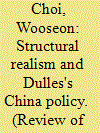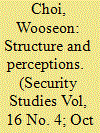| Srl | Item |
| 1 |
ID:
117837


|
|
|
|
|
| Publication |
2012.
|
| Summary/Abstract |
The Eisenhower administration's tough containment policy toward China has been conventionally viewed as an unsensible policy resulting from domestic political pressures or ideology. Refuting the conventional explanations, this article argues that during the early Cold War, the US superiority in bipolarity drove China to balance the United States in Asia. Dulles, the architect of the China policy, made accurate assessments of the power structure in Asia and the inevitable enmity with China. Driven by structural imperative, he decided to pursue containment to maintain the favourable balance of power in Asia by retarding the relative power growth of China allied with the Soviet Union and secondarily by accelerating their conflict through harder pressure on a weaker China. This case long considered as a prime anomaly to balance of power theory actually demonstrates how powerfully distributions of power shape alliance behaviours of states in the anarchic international system.
|
|
|
|
|
|
|
|
|
|
|
|
|
|
|
|
| 2 |
ID:
080504


|
|
|
|
|
| Publication |
2007.
|
| Summary/Abstract |
American policy toward China during the early Cold War has long been considered as a prime anomaly to balance of power theory. Many realists have argued that domestic forces caused a confrontational policy, overriding structural imperative to accommodate China to balance the stronger Soviet power in Asia. Refuting the domestic explanation, I argue that balance of power consideration primarily determined the U.S. policy. Under the powerful pressure of bipolar competition, the Truman administration persistently pursued a realist policy of forming an alliance with Communist China, or at least neutralizing it, through accommodation in order to balance the Soviet Union in Asia. This policy was based on the assessment of Soviet superiority in Asia. However, my analysis of the power structure shows that there was little structural incentive for China to cooperate with the United States against the Soviet Union because the latter was in a somewhat disadvantageous position globally and had limited offensive capabilities in Asia. Further, Chinese leaders perceived the United States as the superior power in bipolarity. Consequently, China formed an alliance with the Soviet Union to check the United States according to its own balance of power logic
|
|
|
|
|
|
|
|
|
|
|
|
|
|
|
|